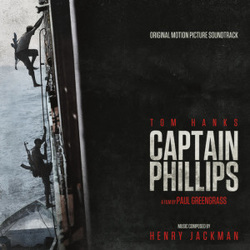
One of the best things that ever happened to Paul Greengrass was his inheritance of composer John Powell when he took over the Bourne franchise. Since then, Powell has provided the scores for all of Greengrass’s films, including The Bourne Supremacy, United 93, The Bourne Ultimatum, and Green Zone. It’s a partnership that has become expected, relied upon for consistent results; the director makes dependably good films and his composer has truly nailed a “sound” appropriate to his style. Because they're so in tune with each other, the duo delivers time and time again. Thus, when John Powell announced his semi-retirement to focus more on his family, by no means a reprehensible choice in light of the busy life of a composer, the film score community was left clamoring to find out who would fill his shoes.
Enter Henry Jackman, composer of such films as X-Men: First Class, Wreck-It-Ralph, Turbo, and the upcoming Captain America: The Winter Soldier. Having worked with Powell on the Kung-Fu Panda short Secrets of the Furious Five, Jackman is a rising star in film scoring who has much in common with Powell stylistically. In many ways, Jackman was not an unexpected choice for the job.
Scoring a Greengrass film is perhaps unlike scoring any other film (with the possible exception of a Kathryn Bigelow film). So much attention is devoted to realism that, as Henry Jackman attests, big thematic scoring is most often rendered inappropriate. With Captain Phillips, Jackman searches for colors, rhythms, and textures to tighten the film’s grip on the audience’s nerves, ensuring a taut, primarily rhythmic accompaniment to the film. As such, Captain Phillips is an effective contribution that inevitably lacks a little as a standalone listen.
If it must be put in context of Powell’s scores for Greengrass’s films, Henry Jackman’s Captain Phillips may come across as a lesser Green Zone, if only for it’s reliance on ethnic, percussive force. Cues like "Choose Your Crew", the latter half of "This is Not A Drill", "Second Attack", and "Negotiation" most heavily feature these elements, the percussion rattling, clapping, and slamming through the cues’ rhythmic motions. Coarse, ethnic strings growl and wail over these rhythms, giving them a harsh intensity that’s only amplified by some Powell-like ostinatos. Interestingly, Jackman also employs vocal percussion in a few choice instances (as in "This Is Not A Drill") to lend the music an organic feel.
Other examples of the score’s tense, action material incorporate the ethnic elements in a subtler fashion, focusing more heavily on aggressive ostinatos and relentless beats. "Two In The Water", "Seals Inbound", and "High-Speed Maneuvers" employ this mix to great effect. The remainder of the cues, with the exception of "Safe Now" (don’t you worry, I’ll get to that one) are exercises in creating subtle tension with minimal elements and orchestration. In these cases, it’s clear that Jackman is trying to avoid traipsing over the film’s realism with heavy-handed suspense cues; as such, this kind of material, as anxiety inducing as it is, is rather anonymous. "I’m The Captain Now", "Do We Have A Deal?", "Entering the Lifeboat" (which features the grating, ethnic equivalent of the horn-of-doom at 1:58), "USS Bainbridge", "End This Peacefully", "Failed Attempt", and "Initiate the Tow" all proceed in this style.
What is confounding about Henry Jackman’s Captain Phillips is its unabashed rehashing of Hans Zimmer’s Inception. Just listen to "Maersk Alabama" and try not to think of its near identical equivalent in Zimmer’s "One Simple Idea". Furthermore, the score’s sole foray into warm, thematic writing, 'Safe Now", is one of the most blatant "Time" knock-offs I’ve ever heard. The soft yet wholesome piano, the descending strings, the distant synth beat, the guitar riffing in the background, the sudden cut-off at its conclusion, it’s all here! Despite Jackman’s best intentions in creating a subtle score that adds tension and seamlessly disappears into the film, these similarities become tremendously distracting and take you right out of the film, leaving you musing as to whether the entire hijacking was just a dream or not.
As a whole, however, Captain Phillips is still a good score that accomplishes exactly what it sets out to do. Without unnecessary embellishment, Henry Jackman has created a taut, streamlined suspense piece that balances ethnic and contemporary styles well. There’s little doubt that director Paul Greengrass didn’t want to stray far from the style of usual go-to John Powell (his United 93 track "The End" even being used in the film), so Jackman’s footprints are largely absent from Captain Phillips. Though it may be a testament to his adaptability and talent, this fact may also be a bit of a disappointment for avid fans of his work.
| A Few Recommended Tracks: "Choose Your Crew", "Safe Now" Label: Varèse Sarabande Availability: 16 track edition (43 minutes) | |

 RSS Feed
RSS Feed
